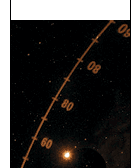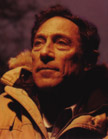

 |
|||
|
Messengers from the Unseen - Page 4 Redefining Reality So once it is established that an experiencer is of sound mind, has been functioning appropriately, and has coped with something so powerful, what then? We are now in misty territory. Standard psychological testing has shown little more than that the person has undergone some sort of disturbing experience. As a culture we have not progressed far in establishing what might be called a science of human experience. If we concede that experiencers have taken part in a real event, one that enters our three dimensional reality without becoming entirely part of it, questions arise such as: What kind of reality is this? Where do the beings come from? What is their relationship to the divine or the demonic? Are there entities or energy forms that manifest in our world but emanate from another dimension or universe? If scientific and philosophical questions are put aside, attention then shifts from the messenger to the message, from the experiencers' mental status to what they can teach us about ourselves and the world. The experiencers then become special witnesses, journeyers into mysterious realms, much like mythic heroes who venture into new lands and return to report what they have seen. And I become a witness to the witnesses, seeking when appropriate to give legitimacy to their accounts, much as religious officials do when they assess the truthfulness of those who report the occurrence of miracles. Behind the nervous efforts to discredit the encounter reality lies a deeper concern. This phenomenon does not stand alone, but is one anomaly among many. Others include near-death experiences, spirit manifestations, shamanic journeys, crop circles, unexplained animal mutilations, and apparitions of the Virgin Mary seen by tens of thousands of people. All of these challenge the limits of our understanding of reality and suggest the presence in the universe of other intelligences that may reach into our world under particular conditions. Furthermore, there are a host of research findings from carefully conducted studies that further stretch our understanding of reality. These include evidence for clairvoyance, telepathic communication, remote viewing, psychokinesis, non-locality, the demonstrated efficacy of prayer and other examples of healing at a distance, and the participatory and cocreative nature of knowledge itself. Taken together, these phenomena tell us many things about ourselves and the universe that challenge the dominant materialist paradigm. They reveal that our understanding of reality is extremely limited, the cosmos is more mysterious than we have imagined, there are other intelligences all about (some of which seem to be able to reach us), consciousness itself may be the primary creative force in the universe, and our knowledge of the properties of the physical world is far from complete. The emerging picture is a cosmos that is an interconnected harmonic web, vibrating with creativity and intelligence, in which separateness is an illusion. The inadequacy of scientific materialism in guiding our understanding and lives has prompted Kyriacos Markides, a distinguished professor of sociology at the University of Maine, to state bluntly that "the secular assumptions about reality, dominant during my university training [and, I suspect, of most of us], were in fact a grand illusion, a materialist superstition that had kept Western thought stranded and imprisoned for the last 300 years." And how do the keepers of the dying, yet more traditional paradigm respond to these phenomena? Many raise the cry of "pseudoscience." "The odds are stacked against science," laments Lawrence Kraus, an internationally known theoretical physicist at Case Western Reserve University, who seems to attribute all interest in the above phenomena to the susceptibility of Americans to be "regaled by stories about the limitless possibilities open to those with–a spirit of enterprise." This is not just silly, but reflects a fundamental epistemological misunderstanding. The methods of science–hypothesis, testing, rigor, experimentation, control–are valuable and essential for studying phenomena that reside primarily in the material world. But they may be inadequate for exploring matters that straddle the visible and the unseen realms. They surely are insufficient for learning about realities beyond the manifest. Here we must rely more upon experience, intuition, non-ordinary states of consciousness, and holistic or heart knowing, thoughtfully and rigorously applied. The failure of the human species, especially in the West and in other parts of the world influenced by Western science and technology, to appreciate the delicate, interconnected nature of all being, is at the root of the havoc we are wreaking upon ourselves and most of the earth's life forms. As Oberlin Board of Trustees Chair Thomas Klutznick wrote in OAM last year, we are witnessing "the first mass dying that is being driven by human activity." It should not be surprising that alien beings and the Blessed Virgin have taken on the role of messengers from the unseen. It is apparent that what we are doing to the earth is a crime of cosmic proportions. No one or nothing intervenes or stops us directly, for that does not seem to be spirit's way. But perhaps we are being helped to wake up and to remember what some native and traditional peoples have never forgotten: that life is fragile and sacred and that we must learn to live in harmony with all the other species of the earth. So, for me, a journey that began with the investigation of a strange anomaly has led to a greater appreciation of the gift of being and a deeper commitment to helping to preserve the life of the planet and its infinite possibilities.
The author or co-author of 10 books and over 150 scholarly articles, Mack’s 1977 biography of T.E. Lawrence, A Prince of Our Disorder, won him the Pulitzer. His unconventional ideas about the existence and purpose of visitations from unknown life forms, brought him criticism and notoriety upon publication in 1994 of Abduction: Human Encounters with Aliens – a title which has since gone out of print. His most recent book, Passport to the Cosmos: Human Transformation and Alien Encounters, was published in 1999. Earlier in his career, in 1969 Mack founded the Department of Psychiatry at Cambridge Hospital and in 1983 he co-founded the Center for Psychology and Social Change with Robert Jay Lifton, M.D., and colleagues. In 1992, Mack was co-chair of the Abduction Study Conference, a landmark gathering of scientists at MIT to discuss alien encounters and in 1993, he founded the Program for Extraordinary Experience Research (PEER) to explore varieties of anomalous experience. Mack is a graduate of the Boston Psychoanalytic Society and Institute and is board certified in child and adult psychoanalysis with over 40 years of clinical psychiatric education and experience. He continues to teach. John Mack '51 spoke at Oberlin College in 2001 on the event of his 50th class reunion. This article expands upon his presentation. (Photo courtesy of the Center for Psychology and Social Change.) |
|
back to top |
 A
Pulitzer Prize-winning author and professor of psychiatry at the
Harvard Medical School, John E. Mack, M.D., '51, has spent the past
40 years exploring the question of how our perception of ourselves
shapes our perception of the world around us.
A
Pulitzer Prize-winning author and professor of psychiatry at the
Harvard Medical School, John E. Mack, M.D., '51, has spent the past
40 years exploring the question of how our perception of ourselves
shapes our perception of the world around us.